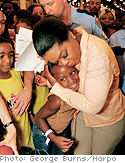What I Know for Sure

I went down to Louisiana five days after Katrina hit to witness for myself the disastrous effects of the hurricane. Maya Angelou described it so profoundly, saying, "The land became water, and the water thought it was God." Sitting in the dry comfort of my Chicago apartment, I'd felt helpless, like many of you. I knew I had to do something. I went in part to assess how I could best serve. Telling the stories of anguish and abandonment, faith and courage was one way. Wrapping my arms around people still in shock that their lives had gone adrift and telling them to hold on to themselves and one another was even more important for me. I remember saying to one woman, "You can come up out of that storm and have a better life." And for a moment she smiled and said, "Maybe you're right."
I spent no more than ten minutes in the Superdome in New Orleans, where thousands of families had waited and waited for five days for help to come. Days afterward, I thought I could still smell the urine and feces, mixed with the pungency of decaying flesh. I imagine the nightmares the survivors must have. I said on the air, "I think we all—this country—owe these families an apology."
The next day, O's editor at large, Gayle King, got a phone call from an irate reader canceling her subscription because "that Oprah has gotten too big for her britches, telling us the government needs to apologize to those people."
What I know for sure is that behind every catastrophe, there are great lessons to be learned. Among the many that we as a country need to get is that as long as we play the "us and them" game, we don't evolve as people, as a nation, as a planet. I see the Katrina travesty as an opportunity for the rest of us to live in the space of an open heart and to show our compassion. Of course there are a lot of big challenges, but therein lies an even greater chance for us to use our emotional response to this disaster in the most constructive way. Over the years, I've heard people lament about why God allows this or that. Babies starve and people suffer not because of what God does but because of what we don't do.
When I went to visit survivors in the Houston Astrodome, my whole body ached from hearing the stories of their agony. My heart was wrenched as I listened to mothers pleading with me to help them find their lost children. So much of what happened in the aftermath of Katrina was man-made. And as we've all seen, there's plenty of blame to go around. But I, too, choose to rise up out of that storm and see that in moments of desperation, fear, and helplessness, each of us can be a rainbow of hope, doing what we can to extend ourselves in kindness and grace to one another. And I know for sure that there is no them—there's only us
I spent no more than ten minutes in the Superdome in New Orleans, where thousands of families had waited and waited for five days for help to come. Days afterward, I thought I could still smell the urine and feces, mixed with the pungency of decaying flesh. I imagine the nightmares the survivors must have. I said on the air, "I think we all—this country—owe these families an apology."
The next day, O's editor at large, Gayle King, got a phone call from an irate reader canceling her subscription because "that Oprah has gotten too big for her britches, telling us the government needs to apologize to those people."
What I know for sure is that behind every catastrophe, there are great lessons to be learned. Among the many that we as a country need to get is that as long as we play the "us and them" game, we don't evolve as people, as a nation, as a planet. I see the Katrina travesty as an opportunity for the rest of us to live in the space of an open heart and to show our compassion. Of course there are a lot of big challenges, but therein lies an even greater chance for us to use our emotional response to this disaster in the most constructive way. Over the years, I've heard people lament about why God allows this or that. Babies starve and people suffer not because of what God does but because of what we don't do.
When I went to visit survivors in the Houston Astrodome, my whole body ached from hearing the stories of their agony. My heart was wrenched as I listened to mothers pleading with me to help them find their lost children. So much of what happened in the aftermath of Katrina was man-made. And as we've all seen, there's plenty of blame to go around. But I, too, choose to rise up out of that storm and see that in moments of desperation, fear, and helplessness, each of us can be a rainbow of hope, doing what we can to extend ourselves in kindness and grace to one another. And I know for sure that there is no them—there's only us



